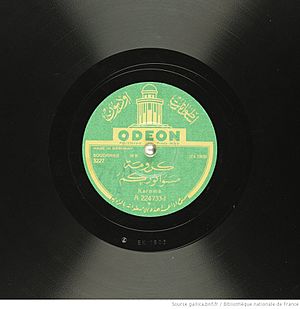Abdel Karim Karouma facts for kids
Abdel Karim Karouma (Arabic: عبد الكريم كرومة, 1905 – 29 January 1947, Omdurman, Sudan), born as Abdel Karim Abdallah Mukhtar, was a famous Sudanese singer and songwriter. He was very active in the 1920s and 1930s in Omdurman and the area around Khartoum. Karouma became one of the first musicians to make the Haqeeba style of Sudanese music popular.

His Amazing Musical Journey
Even though he didn't live a very long life, Abdel Karim Karouma wrote hundreds of songs! He was a very creative musician. He helped create the Haqeeba style of Sudanese music. This style was different because it was not religious. Other singers like Mohamed Wad Al Faki and Mohammed Ahmed Saror also helped create it. A music expert named El Sirr A. Gadour said Karouma brought "new melodies and songs" that were completely non-religious.
Recording Music in the Old Days
You can listen to one of his songs, Msawā nūrkum, online. It was recorded on a 78-rpm phonograph record in the late 1920s or 1930s. This recording gives us an idea of what early Haqeeba music sounded like. In this song, Karouma sings with a group of other singers and percussion instruments. The music and words were still very similar to religious performances called Madeeh.
Old records, like the 10-inch 78 rpm ones, could only hold about three minutes of sound on each side. So, a song that might have been much longer when performed live had to be split into two parts. One part was on each side of the record.
Why Haqeeba Music is Still Loved
The Sudanese cultural website Locale explains why this early style of music is still so popular today. They say that many Haqeeba singers and songwriters worked together and influenced each other. They often sang and wrote songs for one another. This is how this special art form has continued to be enjoyed until today.

